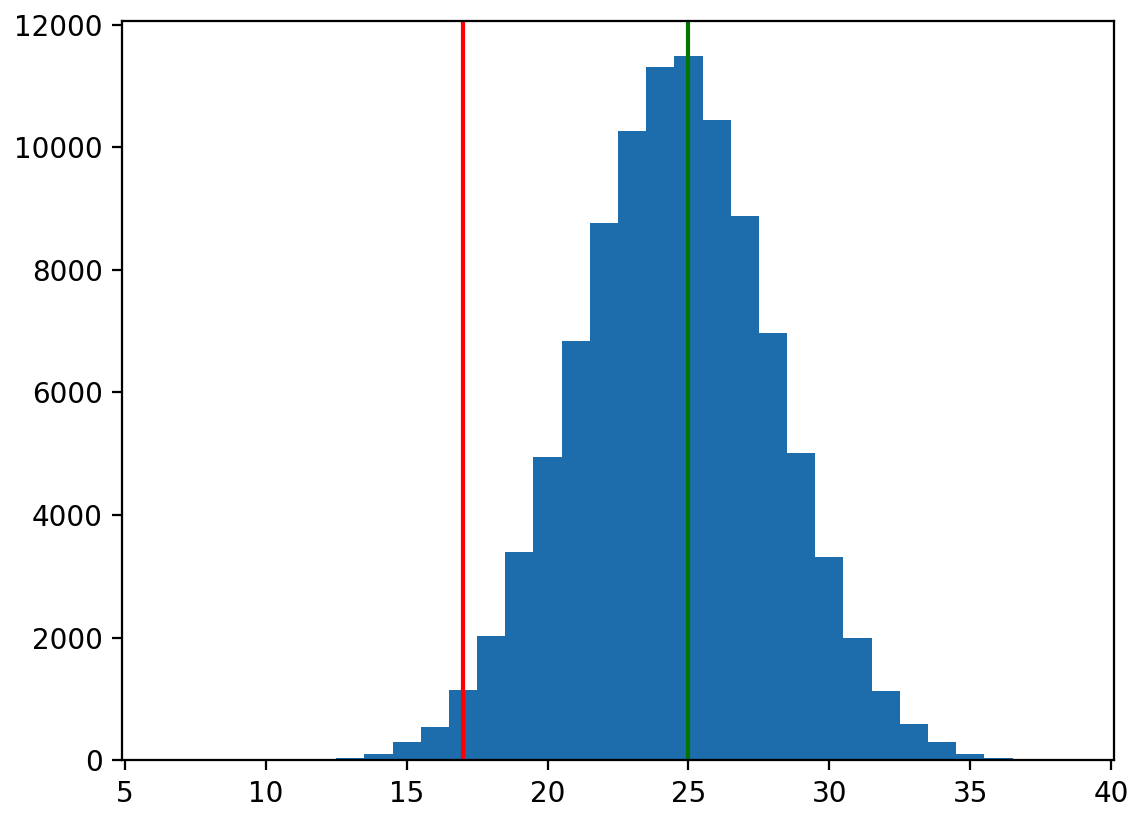Short description: given two binary strings, one "truly random" and one generated by myself, decide which one has been generated by me. Resolves YES if A is the string generated by me and NO if it is B.
More bits will be revealed as time goes on. Currently revealed: 500 (all) bits.
A: 00001001101101110100101000010011000011100100011100010100100011100000011110100101101010110000100111011110000101110110000110001001010011110010100110101111100011101110111111100100001101111110110010000001011010000010110000000010111101110101011010000111000111101110010111100101110001100110111000001101010011100100100110011000100001001011111001111000000010111100010001111111011000110011010011010010010100001011110111100111110011001000110001000111010110101110100000000110000111100110010000110100010110011110
B: 01110110100010110101000101000101101101110100100110101010100010000011010110110100100111101011001100100110001001101000000111010100110101101110100101111010010001110111100101101001010100010110101000101011101010010000001010110110110101000110110100101010010110100010110110100010110110100101011010010101101011110010001011011010010101110101000101001101101011110100001011010111111111001010001101110110010110100101010010100010110111011001001101111010101001101011011010100101011010110010010110101001010110101001
--------
Detailed descriptions:
I have generated two bit strings.
One of the strings was created by me by pressing the buttons "0" and "1" on my keyboard. I produced a bit string of length 500. This took me roughly 115 seconds.
Another string was generated by running the following python code:
import random
for i in range(500):
print(random.randrange(2), end="")
print()
I've labeled these strings A and B by determining that the python-produced bit string is A iff random.org gives me the result 1 with settings min=1, max=2.
I will successively reveal more bits as time progresses, at my own discretion, in the next few days. I'll mainly be optimizing fun with the pacing of new information. The market likely won't be up for more than a week.
The market will resolve at latest when all of the 500 bits have been revealed and people have made their final bets. I reserve the right to resolve the market earlier if it seems wise, e.g. if the market has more or less made up its mind. I won't aim for adversarial resolutions or anything like that.
I won't bet on this market.
I may answer questions about the data generation process and myself in the comments. I may also answer to requests to reveal more bits.
🏅 Top traders
| # | Trader | Total profit |
|---|---|---|
| 1 | Ṁ236 | |
| 2 | Ṁ214 | |
| 3 | Ṁ155 | |
| 4 | Ṁ130 | |
| 5 | Ṁ70 |
Some thoughts on this market:
My overall feeling is positive. The concept was good. People showed up. There was some small disagreement. Someone went and did the math. The market updated accordingly. Very good.
In particular, this was my biggest market yet (by trader amounts), which is nice :)
The data generation process took a lot of concentration. I got tired. One can see myself to fail by a LOT further in the sequence - for example, there are basically no runs of length 4 in the last 100-200 bits. (Except for the long length 1 block, because I am aware that such long runs should appear... but of course it's still blatantly obvious that it's human generated.) So I definitely didn't expect it to go to 500 bits (I just didn't want to run out of bits).
I did expect it to take more than 50 bits, though, and was surprised by how fast the traders got it. The market would have been more interesting with a bit more difficult question, IMO. And I would have liked myself to make a more interesting mistake than "your frequencies for 2-length blocks are way off". Oh well.
The schedule of new information was irregular. Not too bad, but could have been better. The only issue would have been if this had resulted in nobody trading before the result was totally clear, but fortunately that didn't happen.
So in summary, for the next time: have a bit more difficult question. I might arrange something if I come up with an idea that is original and challenging enough to be interesting.
Thanks again for participating, I enjoyed it!
I used an "Aaronson oracle" type approach - look at the frequency of getting a 1 after each 5-gram. Extremely clear result, though this approach took ~250 bits before the P values for the two strings started to diverge meaningfully, whereas other approaches seem to have been able to distinguish the strings with 60 bits.
P ~1×10^-8, it's B without a doubt
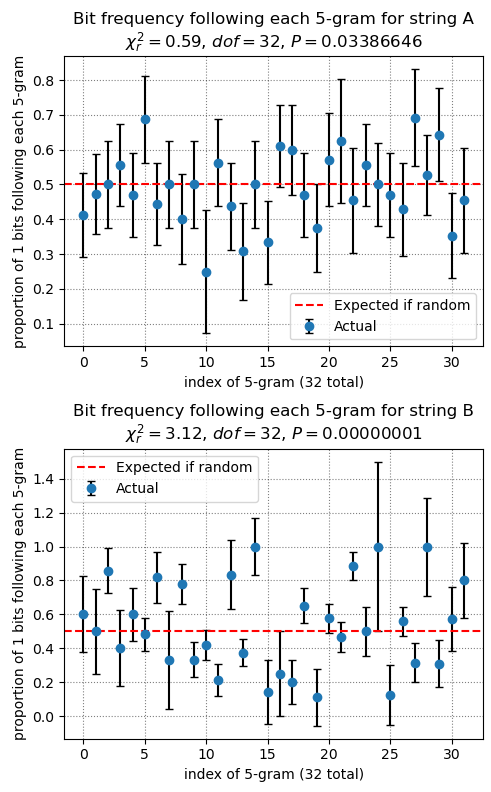
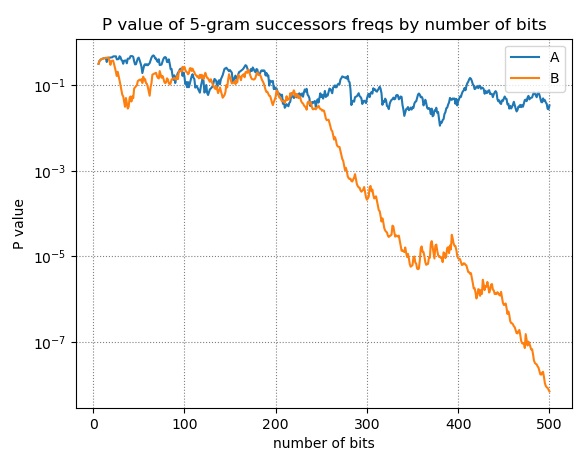
@Loppukilpailija I'll do the resolution in maybe an hour or so. Place your bets before that if you want to do final predictions.
It looks like the people are making up their minds! Hence I revealed just 5 bits this time. I will be revealing bits at a more rapid pace now on if the market won't start doubting itself.
There is just a ~2.2% chance that a random 50 bit string has only 17 cases where a 1 or 0 follows a copy of itself.
50 bits of A have 25, which is exactly the expected value.
50 bits of B have 17. There is only a chance of ~2.2% that a random string has 17 or less.
So im pretty confident it's B.
@unnick @gigab0nus I was looking at the lengths between specific patterns, I got less convincing results than this, so I'm out. gg.
@gigab0nus yes, except i calculated the probability of a string having more than 32 changes (are you sure you didnt accidentally count the number of times the string didnt flip?)
@gigab0nus What I was calculating: counting the number of changes from 1 to 0 and backwards, under the assumption that in a random string the value should change 50% of the time, while a human will tend to change too often. This value is sort of normally distributed and you can calculate the p value. For string 2 it fell down really really fast:
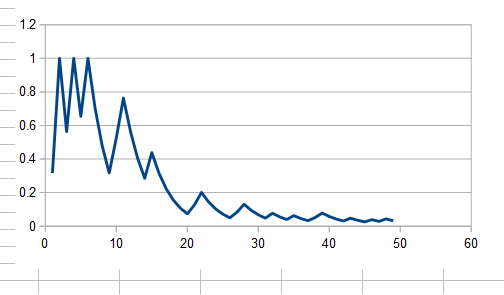
@Tasty_Y Okay, so you could even give an estimate of how many bits you needed for that. I haven't tried that yet.
@gigab0nus It's going to depend on how bad the OP is at pretending to press buttons randomly, but as the picture shows it already looked very fishy after just 20 bits, assuming I didn't mess up the numbers.
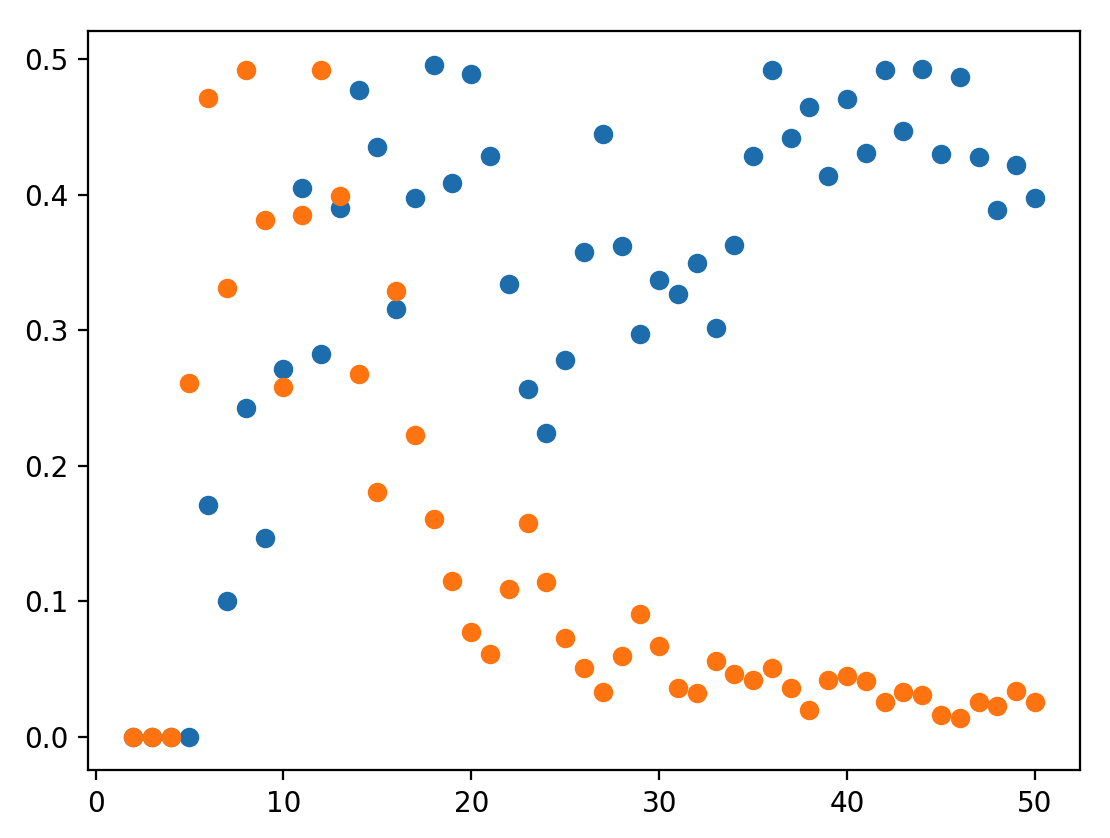
These are basically my confidences. My orange dots should be your blue line. (And my blue dots are for string A)
@gigab0nus I hope @Loppukilpailija doesn't interpret this as "you should have been confident after 20 bits" for the other market.
@gigab0nus I will be looking at when people actually made up their mind, not some hypothetical "this is where you should already have known" (that I don't have access to).
Note: the probabilities at https://manifold.markets/Loppukilpailija/how-many-bits-are-needed-to-disting are way off. (...but I promised I won't trade there.)
